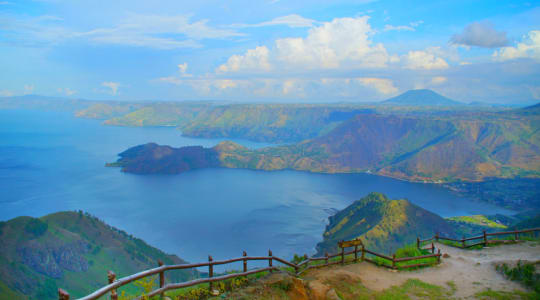Lake Toba is a large natural lake located in North Sumatra, Indonesia. It is the largest volcanic lake in the world and one of the deepest, with a maximum depth of 1,657 feet (505 meters). The lake was formed by a massive volcanic eruption approximately 75,000 years ago, which caused the collapse of the volcano and the formation of a caldera. The lake covers an area of 441 square miles (1,145 square kilometers) and has a length of 62 miles (100 kilometers) and a width of 19 miles (30 kilometers).
The lake is a popular tourist destination due to its scenic beauty, cultural significance, and recreational activities. Visitors can enjoy swimming, boating, fishing, and water sports in the lake, as well as hiking and cycling around the surrounding hills and villages. There are also several hot springs, waterfalls, and traditional Batak villages in the area.
The Batak people, who are the indigenous inhabitants of the region, have a rich cultural heritage and traditional way of life. Visitors can learn about their customs, music, dance, and cuisine at cultural shows, museums, and local markets. The most famous cultural event in the area is the Sigale-gale puppet dance, which is performed during funerals and other ceremonies.
The island of Samosir, located in the center of the lake, is a popular tourist destination and the cultural heart of the Batak people. It is home to many traditional villages, ancient stone tombs, and unique architecture, such as the Toba Batak houses with their distinctive saddle-shaped roofs.
Explore Near Lake Toba
Discover 3 cities within 75km. Perfect for planning day trips, finding connecting flights, or discovering new destinations to explore during your visit.
Nearby Cities Worth Exploring
3 destinations within 37.5km - 63.6km from your location
